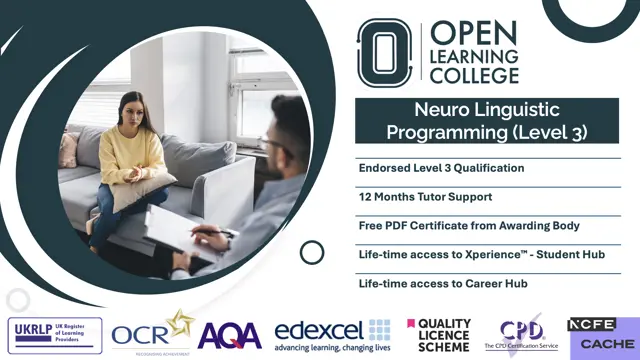Funding options available on our website
- QLS & OPA - Free
- Exam(s) / assessment(s) is included in price
- Tutor is available to students
- TOTUM card included in price What's this?

Funding options available on our website
Embark on a transformative learning journey with the UK’s most innovative home study provider, offering courses designed to unlock your true potential and facilitate the career change you desire. Access our distance learning courses directly from anywhere, anytime, and acquire industry-recognised Professional Qualifications essential for advancing in your career.
Specifically, explore the flexible and convenient Neuro Linguistic Programming (Level 3) course, an ideal way to gain a diploma qualification. Whether you aim for further education, improved job prospects, or expanded knowledge, this comprehensive course allows you to prepare thoroughly for exams or careers through home study. Plus, it’s structured to be accessible and beneficial even if you have no prior knowledge in Neuro Linguistic Programming.
NLP is used to enhance and develop successful personal and professional development. It involves the practice of understanding how people organise their thinking, feeling, language and behaviour to produce the results they do. NLP provides people with a methodology to model outstanding performances that have been achieved by geniuses and leaders in their field of interest.
A key feature of NLP is that we form our unique internal mental maps of the world as a product of the way we filter and perceive information received about our personal environment through our five senses.
This course is for those with special interest in the subject and also for individuals who wish to develop a career in NLP or use its principles in a professional setting.
Digital certificate - Included
Open Learning College have undergone external quality checks to ensure that the organisation and the courses’ it offers meet a high standard. Regular reviews of our courses are carried out as part of the endorsement process.
The course depth and study has been benchmarked at Level 3 against level descriptors published by Ofqual.
Visit www.qualitylicencescheme.co.uk for more information.
1. You will receive your accreditation directly from QLS, once you have successfully completed your course (certification fees are included in the course fee).
2. You will receive the Open Pathway Accreditation Diploma (OPA.dip) from Open Learning College.
Module 1: History, Definition and Scope of Neuro Linguistic Programming
The first module explores the historical background and emergence of NLP and the concepts underpinning its development. The core elements of NLP are discussed, along with the scope and situational contexts that may be appropriate for its use.
Module 2: NLP Models
Students of this module will gain understanding of NLP models and have confidence in the application of these models holistically and contextually. The module also explains the outcome hierarchy and its relation to NLP modalities.
Module 3: Setting the Pace and Communication
A major component of NLP is communication. There are a variety of communication types, such as rapport, pacing and matching, all of which are examined. The way in which these affect the working models within NLP are explored.
Module 4: Values and Belief Systems
This module introduces an examination of various beliefs and values, and considers their relevance to NLP. Maslow’s hierarchy of needs is explained; additionally various theories of attachment are described too. Their association with NLP is also addressed.
Module 5: Modalities
This module addresses our learning styles, as well as the subject of modalities in more detail. Their role in NLP is explained.
Module 6: Different Levels Within NLP
In this module, the student will gain an understanding of the generic levels of the therapeutic approach. The relationship between the different NLP levels, the hierarchy of needs and timeframes of achievement will be explained. Meta levels are introduced.
Module 7: Understanding Language
In this module, we explore and contextualise the acquisition of language in relation to its meaning and understanding within personal experience and cognition. The uses of language as a crucial component of communication are examined.
Module 8: Programmes, Principles and Practice
Ethical responsibilities of the NLP practitioner will be addressed in this module. The student will gain the ability to structure a generic NLP programme which may be adapted to suit specific client needs. This module also explores NLP in practice and the importance of the creation and maintenance of good client-therapist relationships.
Module 9: Modelling, Reframing and Change
This module investigates the processes of modelling and reframing, both of which are precursors to the facilitation of positive change. In addition, the scope of these processes is discussed in relation to NLP, including its limitations. The module explains the techniques of reframing, modelling and anchoring, which are key to successful NLP practice.
Module 10: Specific Applications
The final module considers specific applications and situations for NLP, with appropriate techniques described for each scenario. The course material is reviewed holistically, promoting the student’s understanding and knowledge of the core concepts of NLP in theory and in practice.
(Please click on the curriculum tab above to see a detailed view of each module)
Target Audience
Course Requirements
As a training and development officer, your job is to equip staff with the knowledge, practical skills and motivation to carry out their work activities effectively
Currently there are no reviews for this course. Be the first to leave a review.
This course is advertised on reed.co.uk by the Course Provider, whose terms and conditions apply. Purchases are made directly from the Course Provider, and as such, content and materials are supplied by the Course Provider directly. Reed is acting as agent and not reseller in relation to this course. Reed's only responsibility is to facilitate your payment for the course. It is your responsibility to review and agree to the Course Provider's terms and conditions and satisfy yourself as to the suitability of the course you intend to purchase. Reed will not have any responsibility for the content of the course and/or associated materials.